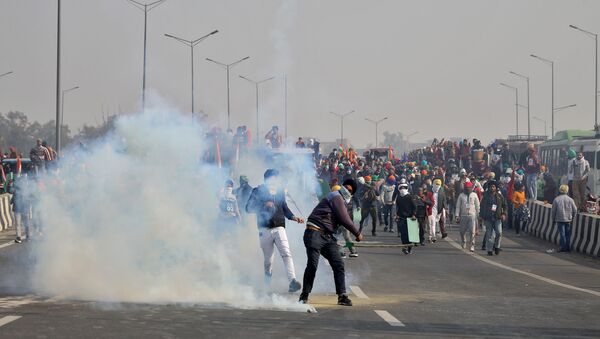After receiving approval from Delhi police, thousands of farmers marched to the national capital on Republic Day, using specified or pre-approved routes. After police used teargas on those not following pre-approved routes, some of the protests turned violent. Delhi police claimed that scores of their personnel were injured in the incident, and at least one farmer was killed.
Farmer Protests, 2021
Indian farmers have been protesting on the borders of Delhi since 26 November, 2020, demanding that three new farm laws passed by the central government September 2020 - the Farmers Produce Trade and Commerce, the Farmers Agreement on Price Assurance and Farm Services and the Amendment to the Essential Commodities Act 2020, be scrapped.
Terrible visuals. Anarchy on parade on Republic day.
— Anand Ranganathan (@ARanganathan72) January 26, 2021
If anything untoward happens, let it be known: the Congress and all those who wanted these farm reforms but fomented anarchy because Modi realised them, will have blood on their hands. pic.twitter.com/7WSFRGkGSy
#WATCH Protesters break barricade, attack police personnel and vandalise police vehicle at ITO in central Delhi pic.twitter.com/1ARRUX6I8E
— ANI (@ANI) January 26, 2021
Delhi Riots, 2020
A peaceful anti-CAA protest in Delhi was held at Shaheen Bagh—a Muslim-dominated area within the national capital—for nearly two months but a counter rally to evict protesters in February 2020 led to one of the worst communal riots in Delhi history in February 2020, as 53 were killed in the subsequent violence.
Over 400 people were injured in riots that ravaged parts of northeast Delhi. Police registered 755 cases related to communal violence.
Protests Over Citizenship Law, 2019
In mid-December 2019, massive protests broke out in Delhi, with citizens expressing anger against the Citizenship Amendment Act (CAA). Over the course of many days, crowds resorted to violence and confrontations with Delhi police officers. At many stages police retaliated with tear gas and batons to disperse groups, and several citizens and police officers were injured. The protests continued until January 2020. Violence was witnessed in several other parts of the country as well.
The controversial Citizenship (Amendment) Act 2019 (CAA), enacted by the Indian federal government, grants citizenship to undocumented immigrants from six religious minorities – Hindus, Parsis, Jains, Christians, Buddhists, and Sikhs, but excludes Muslims from Afghanistan, Bangladesh, and Pakistan if they arrived to India prior to 2015.
Video from inside a washroom at Jamia University in Delhi. One student with a smashed eye, another unconscious on the floor, mirrors smashed by @DelhiPolice @CPDelhi, stop the violence. pic.twitter.com/LU4ZL0sHP9
— Neha Dixit (@nehadixit123) December 15, 2019
Scenes from the Parivartan Chowk in Central Lucknow , where a protest over the #CitizenshipAmmendmentBill2019 degenerated into this ! Really a disgrace to see vandals on the loose ! pic.twitter.com/9nXc9iy5ET
— Alok Pandey (@alok_pandey) December 19, 2019
Resentment on scrapping of Article 370, 2019
In August 2019, the Narendra Modi-led federal government scrapped Article 370 that had given special status to Jammu and Kashmir. In the new regime, the state was split into two Union Territories. The Indian Parliament announcement, made by the Indian Home Minister Amit Shah in the upper house - Rajya Sabha – triggered chaos and massive protest. Jammu and Kashmir’s mainstream leaders, including former chief ministers, Mehbooba Mufti, Omar Abdullah, Farooq Abdullah, Peoples Conference chief Sajjad Lone and bureaucrat-turned-politician Shah Faesal were arrested. Alongside the leaders, thousands were also detained.
Kashmir has always been an integral part of India but this decision will ensure that there will no more be दो निशान-दो सविंधान in J&K.
— Amit Shah (@AmitShah) August 5, 2019
This decision is a tribute to all the patriots who made the supreme sacrifice for a united India.
Congratulations to the entire nation.
The abrogation of Article 370 hasn’t just made accession null & void but also reduces India to an occupation force in Jammu and Kashmir. https://t.co/PS6JxYhSaI
— Mehbooba Mufti (@MehboobaMufti) August 5, 2019
While I’ve been focused on Kashmir I must add a word for people in Kargil, Ladakh & Jammu. I’ve no idea what is in store for our state but it doesn’t look good. I know many of you will be upset by what unfolds. Please don’t take the law in to your own hands, please stay calm.
— Omar Abdullah (@OmarAbdullah) August 4, 2019
Protests by Backward Class, 2018
Millions of people participated in massive protests against the softening of provisions of the Scheduled Castes/Scheduled Tribes (Prevention of Atrocities) Act by the Supreme Court in April 2018. Large-scale violence was reported after Dalit organisations called for a ‘one day shutdown’ across the country, and 9 people were killed and hundreds injured. Property worth millions was reportedly destroyed across the country during the protest.
Pro-Jallikattu Protests, 2017
As the country’s apex court banned the traditional bullfighting sport Jallikattu after years of reports of animal cruelty from PETA and other factions, thousands protested the decision while demanding the Narendra Modi government pass an ordinance to counter the court's decision. Supporters of the violent sport argued that the deadly ritual was central to their cultural identity. The event soon turned violent as police evicted protesters from Marina beach in Tamil Nadu. Later, the government re-legitimized Jallikattu through the legislation of a new law.



